PiL interview:
Sounds, September 17th 1988
© 1988 Sounds
PiL in
Russia:
Holidays in Estonia
Once the punk figurehead of decadent capitalism and threatening enough to be banned from playing the Hammersmith Odeon, John Lydon can still lead PiL onto a stage in front of 130,000 Eastern Bloc fans. Mat Snow joins the group in Estonia where the barricades between East and West finally crumble. Brian Aris waves the flag
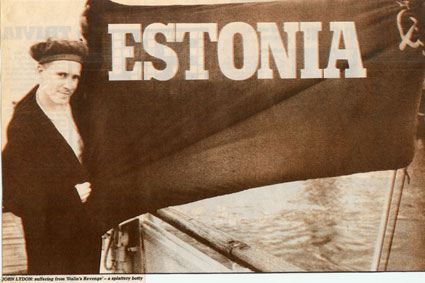 I
LOVE moaning. That's what I live for! cackles John Lydon as he surveys
a pickled herring with an even fishier eye. "I'm going to have
a great holiday. . ."
I
LOVE moaning. That's what I live for! cackles John Lydon as he surveys
a pickled herring with an even fishier eye. "I'm going to have
a great holiday. . ."
No holiday in the sun, this, for John Lydon and Public Image Limited.
A stiff salty breeze is blowing rain and the unsummery spray of the
Baltic Sea over the prow of the SS Georg Ots as we head away from the
Free West towards the Enchained East - or so they used to have us believe.
Behind us lies Helsinki, capital of Finland, and ahead, not yet visible
on the horizon, is an obscure northern shore of what Ronald Reagan once
described as the " eviI empire" - the Soviet Union.
Yes, John Lydon, the man who is still banned from playing London's Hammersmith
Odeon, will this weekend "rock Russia", as The Sun
would have it.'
But we're not going to Russia - we're going to the Soviet Socialist
Republic Of Estonia and, more particularly, its capital Tallinn, a coastal
city of 500,OOO people, half of-whom will spend at least some time at
the three-day festival taking place in the gigantic amphitheatre at
the edge of town.
Tallinn is the USSR's Window on the West. It receives Finnish radio
and TV, and the people themselves are close cousins to the Finns. But
although Estonia is among the most privileged of Soviet Republics (in
addition to having access to images of the West, it also has the Soviet
Union's highest meat consumption), it still struggles for more.
Briefly an independent republic, Estonia was annexed by the USSR in
1940 and World War II was 'Russified' to dilute nationalist feeling.
'Russification' means that Russians loyal to Moscow took over the best
jobs and flats in Estonia but this has bred resentment.
The Estonians don't want independence, but they want more say in running
their own affairs, both political and economic.
Two years ago they were once more legally allowed to display their black--white-and-blue
national flag, a vital symbol for the Estonians of Moscow's new policy
of glasnost (an end to secrecy and repression of dissenting opinion)
linked to perestroika (political, social and economic reconstruction).
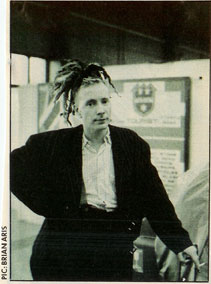 Being
the most Western-influenced of Soviet Republics, what happens in Estonia
today may well happen in the rest of the USSR tomorrow. Estonia is the
Soviet Union's test-bed for new freedoms, new ideas.
Being
the most Western-influenced of Soviet Republics, what happens in Estonia
today may well happen in the rest of the USSR tomorrow. Estonia is the
Soviet Union's test-bed for new freedoms, new ideas.
And that the man officially declared -for years by Pravda to be a "fascist"
' and arch-symptom of decadent capitalism will be stepping out onstage
in front of at least 130,000 rapturous Estonians is a genuine capital
E Event -and an Event not just in the epochal rock career of the erstwhile
Johnny Rotten, nor even for the expectant Estonians in their vast diversity
and multitude, but perhaps for all of the Soviet Union, and therefore
for all the world. .
Not surprisingly, amid all the jollity that successful rock bands on
tour generate, there is a fraught mixture of apprehension, disbelief
and sheer sense of occasion that maybe, just maybe, they're on the cutting
edge of something truly momentous.
As it turns out, very Shortly John Lydon does have something to moan
about,
In the words of PiL's song 'Fat Chance Hotel', "The dinner gave
me the splattery botty". Nor was he alone; everybody got Stalin's
revenge, guitarist John McGeoch in particular "pissing through
his arse" for days on end.
Rotten (as the others all refer to him behind his back) cackles at the
hotel floor assistant's bemusement when he complained that there were
only 16 sheets of prison-issue bog paper in his hotel bathroom.
"'But that's all you're allowed!'… So I used the
towels! Honestly, Estonia gives you the runs, big time!"
John's patented snottiness aside, the PiL party are a couth and well-dressed
crowd. Even John - a self-confessed "style-pig" - has a new
outfit for every part of the day, favouring orange Adidas track-suits
as leisurewear: The sporting theme is continued in John McGeoch's scarlet
Soviet ice-hockey strip and bassist Allan Dias' skin-tight baseball
knickerbockers. Only guitarist Lu Edmonds, the band's linguist, dons
the Englishman-abroad linen suit; he bears a resemblance to the young
George Orwell.
Let it not be said that PiL are the greatcoat band; they played their
show in shorts to a man, Lydon's in particular being a fetching pastel
polka-dot, His candy-coloured locks, incidentally, are all his own.
"WHAT REALLY impressed me about the audience when I went onstage
was how
colourful their clothes were. But if you go to Donington, for instance,
it's just denim for miles in every direction.
"They have a much better sense of freedom in that way. They really
reject uniforms - I don't care why. It's what you would have liked Hyde
Park to have been for The Rolling Stones. They're more involved, if
you like, with their own individuality without it being an ego trip."
He recalls Pil's early days, when he first met the band's current ace
drummer Bruce Smith, then doing the business for Bristol's Pop Group
(led by Mark Stewart).
"With all of this, we'd never put a title to what we were doing.
We never called it punk rock, or jazz rock, or disco, or anything at
that time. And that's what made it work," he drones his voice sliding
from a theatrical Fagan to a classic Ken Livingstone nasal whine.
"It was stupid bitches like Caroline Coon that decided that I was
the King Of Punk! Which was a ridiculous thing to say! What the f***'s
a punk? I spent weeks quizzing that term. It wasn't in the Oxford English
Dictionary. It's slang for a male prostitute in American prisons. Wonderful!
I'm the king of male slags? I'm a whore? I fail to think so!
Despite the mohawk hardcore who still crowd the first few rows of a
PiL gig in the West, Lydon's decade-long quest to de-punk both himself
and his audience reached its symbolic end this bright Sunday afternoon
behind the Iron Curtain. .
As the Estonian MC gave PiL an incomprehensible but undoubtedly huge
build-up, you. Could feel the massive crowd thicken like an animal with
anticipation. It was actually going to happen Johnny Rotten was going
to bounce onto the stage in a matter of seconds!!! And to storm-warning
bass riff of 'Public Image' he did.
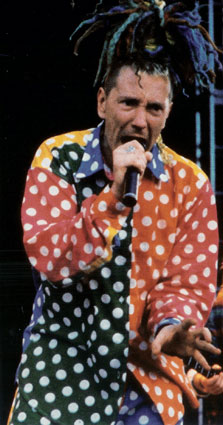 The show is a blinder. Every single band member, including John Lydon,
reckon it was their finest hour. PiL's glittering aerial metal-funk
suits a sunny day, and they reach climax after climax, including the
bulk of the 'Happy?' album.
The show is a blinder. Every single band member, including John Lydon,
reckon it was their finest hour. PiL's glittering aerial metal-funk
suits a sunny day, and they reach climax after climax, including the
bulk of the 'Happy?' album.
With a firm hand at the helm, John Lydon sets sail with all the good
tunes, and the band he has toured and written with since 1986. Bassist
Allan Dias and drummer Bruce Smith have welded together a intricate
framework of sprightly rhythms and brooding post-gothic rifferama that
glides past with all the poise and menace of a battleship slicing through
choppy seas.
John McGeoch (the band's- diplomat) establishes solidarity with the
crowd as soon as he walks on stage waving an Estonian national flag
wild applause, but the unity between the performers and the audience
ran deeper than token gestures.
Yet who would have thought that such disparate thong would prove to
be PiL's greatest audience?
A few punks had made the difficult journey from Leningrad a couple of
hundred miles east, but mostly the kids here were tribally non-aligned.
You realise how many British youth cults would simply cease to exist
without the availability of hair-gel. You saw uniformed soldiers on
leave, sturdy folks in their 60s, young children. In a day pregnant
with symbols, the most touching was the little girl who could have been
no more than eight- years-old sitting on her father's shoulders and
waving her arms in the air to the strains of 'Rise'.
And from the stage, the first 60 yards of audience was a sea of arms,
home-made PiL flags (the local bands make their own instruments, imports
being prohibitively expensive) and banners reading 'Johnny Rotten Is
Good' (the Estonians are not prone to verbal hyperbole) and 'PiL Is
Good Idiotism'. As Lydon sang in 'Holidays In The Sun', the set's only
Pistols number, "I'm looking over the wall/And they're looking
at me…"
Both sides liked what they saw.
After the gig, John is trying to find something to say to match the
significance of the event we've all just gone through. The themes he's
been harping on about ever since the Pistols collapsed and he started
PiL a decade ago seem more pertinent than ever, but no better defined
- freedom, individuality, anti-authoritarianism, personal choices, honesty.
Perhaps they're best kept vague - more like banners than bye-laws.
"THE MINUTE I hit the stage I lost my voice because I was so enthused
and trying so damn hard for the first two numbers," grins Rotten
afterwards. "I completely destroyed myself, and I've never had
that before in my entire life. I'm quite nonchalant once I've got onstage.
"Those people just loved us to death for just being there - that
was so completely obvious. And quite frightening; I'm used to being
booed. The Sex Pistols never played to anyone without booing. That was
my introduction to music - Boo! Get Off! Rubbish!
"This is the major achievement so far," he continues. "The
official bureaucracy had declared me a fascist for ten years, but the
general public knew different. But they'd never seen me live, never
had the opportunity to speak to me. All they knew is what they'd seen
on Finnish TV, the few videos we d done.
"I tell you, I now see videos in a completely different light.
I thought they were boring and pedestrian because I thought everybody
had access to records; it isn't the case. They saw 'Rise' on TV - they
were singing along word for damn word. Impressive stuff. "But here
we are in Estonia because everybody else seems just to have turned it
down as a non-event!"
This is true. From Britain, only Steve Hackett (Genesis are massively
popular in the Soviet Union) and Big Country played; and from Sweden,
The leather Nun appeared. Otherwise, this international festival boasted
just Finnish and Soviet acts. No American acts at all.
This was partly a result of the organisers' policy to invite the acts
from abroad as late in the day as possible. To do otherwise might have
drawn too much international attention to the festival and thereby risk
Moscow pulling the plug on what might be seen as an Estonian nationalist
rally being embarrassingly splashed all over Western newspapers and
TV screens.
As it turned out, any official presence - never mind interference -
was low key to the point of invisibility.
"I found the whole covert nature of society surprising and funny
in a way," observes Bruce. "Everything is so underhand, like
constantly making a drugs deal. Even buying a f***ing loaf of bread!
And it breeds an atmosphere of caution."
"But that coupled with people who desperately want to impress you,"
adds John McGeoch. "And the way they apologise at the state of
the supermarket - it's so sad."
"We confirmed their idea of decadent Westerners," sighs Bruce.
"It's bizarre - all Our sensibilities were attacked," ponders
John Lydon, "I'll have to sit down and calculate this. It'll take
me weeks to understand what I've experienced. I might appear to be flippant,
but I'm really not. It'll take a long time for me to swallow."
WE'RE ON our way home, caught in a limbo between two realities, that
of Estonia and that of The Sun condensing the event in the headline
"Rotten Luck, Russia!"
"I think I've been butchered and bastardised more than most people,"
observes Lydon truthfully, if not for the first time in his life. But
by force of repetition, he hopes that the correct picture will some
day prevail.
Mildly embarrassed at such a high-culture reference, he cites 'The March
Of The Capulets', a remorseless passage from Prokoviev's Romeo And Juliet,
as symbolic of his personal struggle.
"I find stuff like that real inspiring: it goes on and on and on.
That's the way you must be. You mustn't let the bastards grind you down."
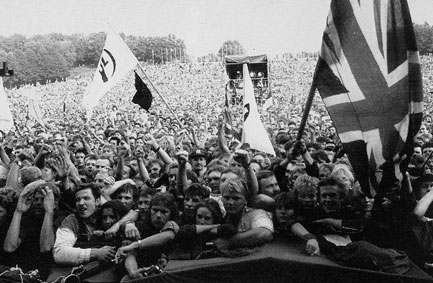
![]()
The Sun, August 25th 1988
Rotten Luck, Russia!
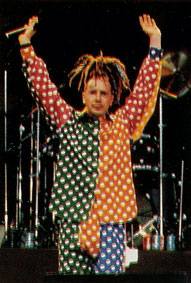 FORMER-Sex
Pistol Johnny Rotten is taking punk to Russia in a new bid to boost
Glasnost.
FORMER-Sex
Pistol Johnny Rotten is taking punk to Russia in a new bid to boost
Glasnost.
Kremlin chiefs told him his latest band Public Image could play
at a three-day festival starting there tomorrow.
Half a million Russian rock fans are expected to turn up to see
Rotten, 32, and other British acts like Big Country and ex-Genesis
star Steve Hackett.
Future Film producer Jay Rifkin, who is help-ing to organise the
Glasnost Rock 88 festival, said: "This signals the start of
a very positive future for rock in Russia."
Rotten - now calling himself John Lydon recently turned down a £2million
offer by U.S. businessmen to reform the Sex Pistols.
![]()
John on the way to Estonia, Sounds, August 1988 © Brian Aris
John in Estonia, Sounds, August 1988 © Brian Aris
PiL live in Estonia, Sounds, August 1988 © Brian Aris
PiL live in Estonia, Sounds, August 1988 © Brian Aris
PiL live in Estonia, Sounds, August 1988 © Brian Aris